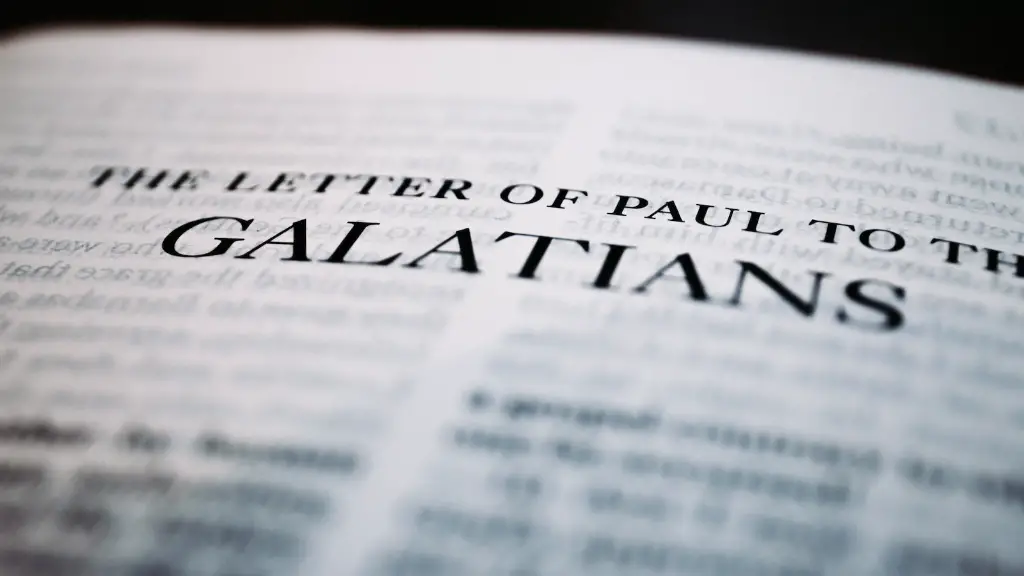Homosexuality is a complex issue. It is one that has been discussed and debated through the ages, and it is still controversial today. As many cultures have become more accepting of homosexuality, religious organizations have chosen to remain in the dark, failing to provide a solid position or opinion of it. One of these organizations is the Bible. To determine what the Bible actually has to say about homosexuality, one must look to three main sources: the Old Testament, the New Testament, and Biblical interpretation.
Old Testament
The Old Testament does not present any direct condemnations of homosexuality. One must dig deeper to determine what it is trying to tell us. In Leviticus 18:22, it states, “You shall not lie with a male as with a woman; it is an abomination.” Leviticus 20:13 also lists homosexuality as an abomination and states that if someone lies with a male as with a woman, both men should be put to death. These passages, some believe, reflect the ancient Near Eastern prejudices based on a strict gender binary and the idea of heterosexual marriage as the only legitimate sexual relationship.
Others, however, argue that the passages merely reflect a condemnation of the use of homosexual behavior in fertility cults and religious prostitution. These scholars suggest that the passages are more concerned with the improper use of what may have been considered a necessary form of birth control or a way to produce children in certain times and environments.
New Testament
The New Testament does not have any direct prohibitions of homosexuality. However, Romans 1 does contain a description of various behaviors that Paul claims are signs of God’s wrath. One of these behaviors is same-sex relations. Here, it reads that “their women exchanged natural relations for those that are contrary to nature” and “the men likewise gave up natural relations with women and were consumed with passion for one another.” The term “natural relations” here is viewed by some scholars to refer to same-sex attraction and behavior while others believe it reflects a perspective of heterosexual relationships as the only legitimate form of sexual expression.
It is important to note that, while Paul tells us that these activities are unacceptable, he does not condemn the people engaging in them. He further states that homosexuality is not the root cause of sin, but rather the result of the human condition. Thus, the passage seems to be more concerned with human frailty than the act itself.
Biblical Interpretation
The Bible does not directly address the morality of homosexuality. For that, one must look to biblical interpretation. This is, in some ways, a slippery slope. Everyone brings their own perspectives and judgments to the interpretation of scripture, and this can lead to varying conclusions.
Some theologians and pastors take the writings in Leviticus and Romans as literally meaning that all forms of homosexuality are immoral. Others, however, believe that we must look to the overarching themes of the Bible to determine our opinion. For instance, the Bible focuses much of its attention on love and compassion, respect, and hospitality towards others, regardless of gender or sexual orientation. Therefore, it is argued, these values must be taken into consideration when forming a biblical understanding of homosexuality.
Ultimately, the Bible does not provide a definitive answer when it comes to the morality of homosexuality. There are some who view it as an abomination while others see it as an expression of love and acceptance. The reader must look to other sources to help them make their own opinion.
What Makes Homosexuality Different?
When trying to understand the Bible’s stance on homosexuality, one must ask the question: What makes homosexuality different? For example, the Bible does not speak out against homosexual behavior in the same way it does for other practices such as idol worship or murder. The simple answer is that homosexuality is a unique form of sexual expression, and because of this, requires a different approach.
When discussing homosexuality, we must recognize that it is not an isolated issue. Rather, it is part of a larger conversation. This conversation involves asking questions about gender roles, relationships, and societal expectations. For example, what is the place for non-traditional relationships? How do we handle modern sexual practices such as same-sex marriage or transgender rights? These are the types of questions that the Bible does not provide clear answers to.
Where Does The Bible Draw The Line?
The Bible is not a book of laws, nor does it provide a concrete answer when it comes to homosexuality. There is no one-size-fits-all way to interpret the Bible, as different individuals and cultures place varying weight on the different passages. Thus, the individual must search for their own interpretation within the text.
When trying to understand what the Bible says about homosexuality, one must look at how it is framed within the text. Is it presented as something to be punished or to be accepted? Does it encourage love and acceptance, or is there a tone of condemnation? These are the questions we must ask in order to draw a line on what the Bible says and does not say about homosexuality.
The Role Of Culture
The Bible is not a book that is interpreted in a vacuum. It is, instead, subject to the interpretations and views of culture. For example, what we may consider conservative views of homosexuality today may have been seen in a different light in the Bible’s time. In addition, cultural norms can shape what the Bible’s words are taken to mean.
Further complicating the interpretation is the fact that culture is constantly changing. What may have been acceptable behavior in the past may be seen as wrong or outdated today. Additionally, different values and beliefs are adopted by different people and cultures, so what one culture may consider immoral, another may not.
How Should We Respond?
When it comes to understanding the Bible’s stance on homosexuality, it is important to approach the text with an open mind. There may be passages that one finds difficult to comprehend on their own, but that does not mean that they must be taken at face value. If scripture is to be accurately interpreted, it must be read in its entirety and in its historical context to paint an accurate picture.
Further, it is important not to view homosexuality as a monolithic issue, but rather as part of a larger conversation. This conversation must involve respect, understanding, and open dialogue between individuals on all sides of the debate. Ultimately, it is up to each individual to decide what the Bible says about homosexuality for themselves.
The Role Of Love
No matter their interpretation of what the Bible says about homosexuality, believers must not forget the core teachings of the Bible. Above all, the Bible calls us to love one another. This includes loving those who are different from us, or those who have beliefs that challenge our own. Love does not condemn or judge, but instead, seeks to understand. This should be the guiding principle when looking to the Bible for its stance on homosexuality.
It is also important to remember that, while the Bible provides a framework for morality, it is up to us to make the final decision. We should always seek to use our moral compass — one rooted in understanding and love — to guide our actions. Ultimately, how we respond to the issue of homosexuality is up to us.
The Openness Of God
When discussing the Bible’s stance on homosexuality, it is also important to remember that God is an open God. This means that He is not a God of exclusion, but one who welcomes all people, regardless of their beliefs or orientation. This includes those who are LGBTQ+ or have non-traditional beliefs and relationships.
God does not judge or condemn, but instead, He seeks to love and accept all of His children. This is why it is so important for individuals to look to the spirit and teachings of the Bible, and not just the letter, when it comes to forming an opinion on homosexuality.
How We Can Move Forward
When forming our opinion of homosexuality, it is important to look to all sources — the Bible, theological scholars, and others. We should also take into account the wealth of opinions the Bible contains. We should not be quick to judge or condemn, but instead, look to understand those around us and accept them.
It is also important to recognize that we will never have a universal answer about the morality of homosexuality and we may often disagree. Despite this, we must strive for love and acceptance in all of our interactions and conversations. Let us strive to remember that, no matter what the Bible has to say about homosexuality, love is at the center of all that God does.





